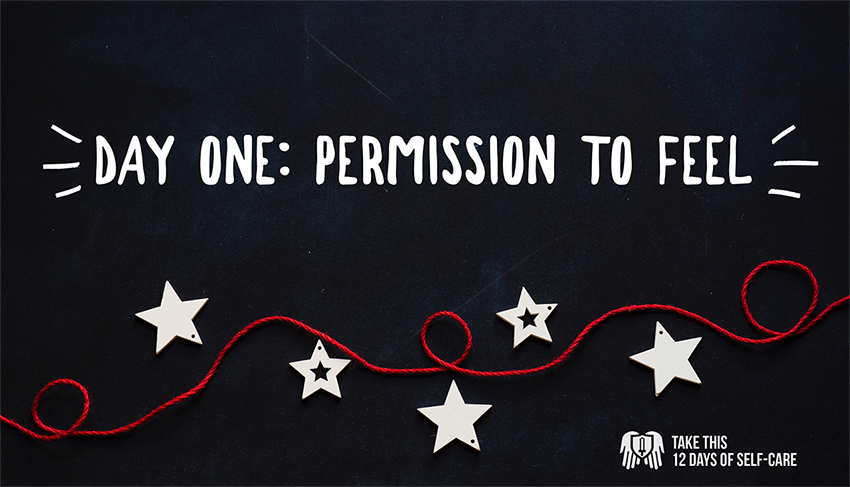
Welcome to the first article of Take This’ 12 Days of Self-Care series. We want to give our readers and supporters, both new and old, some helpful tips on coping with common stresses of the holiday season and the transition into the new year. These are written by our wonderful Take This volunteers. Many are clinicians, while some authors write from a more personal, non-clinical perspective. You’re going to hear a lot of similar themes repeated across the twelve articles, and that’s a good thing: self-care takes repeated practice of fundamental skills. It’s not something you learn overnight, but we can make a start right now!
Let’s begin with some honesty about our own feelings. One of the harshest things many people wrestle with at the end of each year is confusion about how they are supposed to feel. I don’t know about you, but I didn’t receive a welcome packet when I was born, and I definitely didn’t receive a walkthrough or guide on emotions. Maybe IGN wrote one, but I haven’t seen it. Nevertheless, many people feel guilty when they don’t feel what they’re “supposed” to feel this time of year. That guilt is a common topic in therapy offices from Thanksgiving into the new year. Where do get this belief that there is a right and wrong way to experience the holiday season?
We’re bombarded with stories and songs about good times, family, cheerfulness, giving, joy, happiness, and ease, as if our lives are supposed to be a Norman Rockwell painting. While stories can be great guides and aspiration goals, they are not real, and they can be harmful ideas if we hold to them too rigidly. Real life is messier. Real life doesn’t wrap up at the end of a 30-minute episode. Real life has more… reality. Still, people hold themselves up to these storied ideals, as if this is the way only way our lives must be. This perfectionistic rigidity is a type of distorted thinking. One highly irreverent psychologist named Albert Ellis termed this particular flavor of distorted thinking “MUSTerbation”.
Let’s say you’re struggling with this. Here’s how you begin to work with your feelings honestly:
- Ask yourself, “Why should I feel certain way? What are the consequences for simply feeling an emotion? Am I doing this for myself or for other people? When am I allowed to feel what I want?” You might be setting yourself an impossibly high standard.
- If you’re stressed about something, acknowledge it, and give yourself permission to feel it. We must name a problem to begin tackling it, and we can’t do that by denying that it’s there or minimizing it. A problem is a problem is a problem.
- Once you’ve acknowledged the stress is real, ask if your feelings match the magnitude of what’s going on in your life? If you feel anxiety around the holidays, was there something that caused this? It might make total sense that you feel anxious. Maybe it’s something from earlier in your life that’s bubbling up. That also might make sense. Maybe you now realize you’re putting undue pressure on yourself due to unrealistic expectations of the consequences.
- If you realize that you’re trying to fake an emotion based on an unrealistic ideal, provided it’s not impacting your day-to-day activities (e.g. your ability to hold a job) or hurting people, it’s okay to change your behavior a bit. Maybe you don’t have to go to every holiday event.
If this works, and you’re able to resolve the inner turmoil, then great! If your emotions continue to bother and confuse you, maybe talking to a mental health professional would be a good next step. They’re great at helping people sort out feelings, and that’s never a bad way to end a year: with understanding, wisdom, and a path forward towards personal resolution.
Keep following us for eleven more days of self-care articles from people who want you to know you’re not alone in whatever you feel. The end of the year can be challenging for a variety of reasons, and we want to help you navigate your way through it. It’s dangerous to go alone.
This article is not a substitute for medical advice or professional counseling. While we at Take This want to provide you with resources, we do not recommend or endorse any particular site, treatment, therapy, or resource. We provide these links at our sole discretion but have not necessarily vetted or reviewed any particular resource. We assume no liability for the use of the information or resources on these sites and encourage you to use your own best judgment when reviewing these resources.
If you live in the US and you’re having suicidal thoughts, reach out to the Suicide & Crisis Lifeline or call/text 988. If you’re outside the US, you can find local crisis lines at Suicide.org. If you’re even debating whether you should call them, you should call them. The Suicide & Crisis Lifeline handles all psychological crises, not just suicide.
